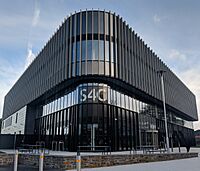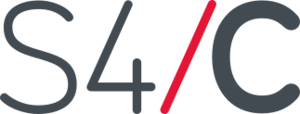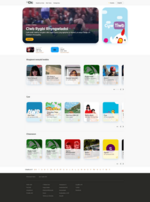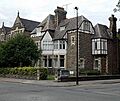S4C facts for kids
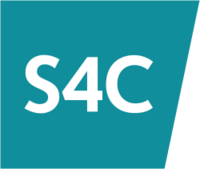
Logo used since 2014
|
|
| Country | United Kingdom (Wales) |
|---|---|
| Broadcast area | Wales |
| Headquarters | Canolfan S4C Yr Egin, Carmarthen, Wales |
| Programming | |
| Language(s) | Welsh |
| Picture format | 1080i/1080p HDTV (downscaled to 576i for the SDTV feed) |
| Ownership | |
| Owner | S4C Authority |
| History | |
| Launched | 1 November 1982 |
| Availability | |
| Terrestrial | |
| Freeview (Wales only) |
|
| Streaming media | |
| S4C Clic | Watch live (UK and Ireland; with adverts) |
| BBC iPlayer | Watch live (UK only; without adverts) |
S4C (which means Channel Four Wales in Welsh) is a TV channel that broadcasts in the Welsh language. It's free to watch for everyone in the UK. S4C started broadcasting on 1 November 1982. It was the first TV channel made especially for people who speak Welsh.
S4C's main office is in Carmarthen, Wales. It's located at the University of Wales Trinity Saint David's creative centre, Yr Egin. S4C also has offices in Caernarfon and Cardiff. In 2024, S4C had about 118 employees.
Like Channel 4, S4C doesn't make all its own shows. Instead, it asks independent companies to create programmes for them. BBC Cymru Wales also makes shows for S4C, including the news service Newyddion.
For many years, S4C also showed programmes from Channel 4 in English. These were usually shown when fewer people were watching. After 2010, S4C started broadcasting only in Welsh. You can still watch S4C shows with English subtitles. S4C is still the only Welsh-language TV channel in the country.
Contents
History of S4C
Before the Channel Started
Before S4C began in 1982, Welsh speakers could only watch a few programmes in Welsh. These shows were on BBC Cymru Wales and ITV Cymru Wales. They often aired at odd times, which was frustrating for Welsh speakers. It also annoyed non-Welsh speakers because their regular English shows were sometimes moved or cancelled.
In the 1970s, people who wanted to protect the Welsh language campaigned for a special TV channel. They wanted a channel just for Welsh speakers. Both major political parties, the Conservatives and Labour, promised a Welsh-language channel if they won the 1979 election.
However, after the Conservatives won, the government decided against it. This made many people upset. Some people protested by refusing to pay their TV licence fee. Others held sit-ins at TV studios. Some even damaged TV transmitters in Welsh-speaking areas.
In 1980, a famous Welsh politician named Gwynfor Evans threatened to go on hunger strike. He said he would not eat until the government kept its promise to create a Welsh-language TV service. This strong action helped convince the government to change its mind.
S4C's Early Years
The name S4C was chosen at a meeting in 1981. It was the only name considered for the new channel.
S4C started broadcasting on 1 November 1982. It showed about 22 hours of programmes each week. Most of these were during prime time, from 7 PM to 9:30 PM. There was also a special time for children's shows in the afternoon. The channel also showed English programmes from Channel 4, but these were scheduled around the Welsh shows.
The first night of S4C included a preview show and the first episode of SuperTed. SuperTed was a popular animated show that helped start a lot of animation production in Wales.
S4C was designed to be bilingual, but it didn't just translate English shows. It understood that Welsh and English viewers had different interests. Over time, the cost of making programmes for S4C increased.
Later Developments
In 2010, S4C faced some challenges with its funding. The way the government provided money changed, and S4C's funding was reduced. This caused concerns about the channel's future.
Like other TV channels, S4C is now working to reach viewers who watch on phones and tablets. It also competes with many streaming services.
Moving Headquarters
In 2013, S4C started looking into moving its main office. Its old headquarters were in Llanishen, Cardiff. In 2014, it was announced that Carmarthen was chosen as the new location. The new building, called Canolfan S4C Yr Egin, was built on land owned by the University of Wales Trinity Saint David. Other creative companies also share this building.
S4C started moving to the new building in Carmarthen in September 2018. About 54 jobs moved there. S4C also kept an office in Cardiff. In January 2021, some S4C departments moved into the new BBC Cymru Wales New Broadcasting House in Cardiff.
Programmes on S4C
S4C's main goal is to offer a wide variety of programmes in the Welsh language. S4C does not make its own shows. Instead, it asks independent companies and BBC Cymru Wales to create them.
S4C is known for commissioning animated shows. Some popular ones include SuperTed, Wil Cwac Cwac, and Fireman Sam.
BBC Cymru Wales provides many Welsh-language programmes to S4C for free. These include the news show Newyddion and the soap opera Pobol y Cwm. They have also provided Welsh versions of English shows, like the original Teletubbies.
To help English speakers, all Welsh-language programmes on S4C have English subtitles. Some children's programmes, like Cyw and Stwnsh, even have Welsh subtitles with English translations for harder words. Some films made for S4C have been very successful, like Hedd Wyn and Solomon & Gaenor, which were nominated for Oscars.
S4C used to have its own text service called Sbectel. This service ended in 2009. When the analogue TV signal was switched off in 2010, S4C stopped showing Channel 4 programmes. Since then, it has only broadcast its own Welsh-language shows and some from BBC Cymru Wales.
How People Watch S4C
In 2022–2023, about 6.3 million people across the UK watched S4C on TV at some point. Each week, around 509,000 people in the UK watched S4C. In Wales, about 324,000 people watched S4C on TV each week, which was the highest number in five years.
The most-watched programme on S4C in 2022-2023 was Sgorio's coverage of the Wales' football match against Belgium. It was watched by 456,000 viewers.
Digital Channels and Services
When digital TV started in 1998, S4C launched a second channel called S4C Digidol (meaning 'digital'). This channel broadcast only in Welsh. After the analogue TV signal was switched off in Wales in 2010, S4C became fully digital. It is now available across the UK and Ireland on services like Freesat and Sky.
S4C also had a sister channel called S4C2 until 2010. This channel used to show live coverage of the National Assembly for Wales. Now, you can watch these proceedings online or on BBC Parliament.
In 2008, S4C launched a special block of programmes for young children called Cyw (meaning 'chick'). It airs on weekdays and includes many shows for nursery-age children. S4C also has a block for older children called Stwnsh.
In 2010, S4C launched a high-definition (HD) version of its channel called 'Clirlun'. However, due to funding cuts, Clirlun closed in December 2012. S4C HD relaunched in June 2016 on Freesat and Sky. It returned to Freeview in HD in January 2022, broadcasting during peak viewing hours.
Since December 2014, S4C programmes have also been available on the BBC iPlayer website, both live and on demand.
S4C's Look and Feel
S4C's on-air look has changed several times since it launched. These changes often reflect Welsh society and culture.
1982–1987
When S4C first started, its idents (short clips shown between programmes) featured natural landscapes from Wales. The logo would form as WALES4CYMRU.
1987–1993
In 1987, the idents changed to a computer-generated animation of a new, simpler S4C logo. The colours of the logo were blue, green, and red. In 1990, new idents showed a piece of Welsh slate with blue, green, and red colours washing over the letters S4C.
1993–2007
In 1993, S4C introduced idents that showed everyday objects acting like dragons. This was a nod to the Welsh dragon on the flag of Wales. In 1995, a new logo was introduced. It featured a wavy line (like a tilde) next to the "C", looking like a dragon breathing fire. This symbol was meant to show "Welsh heritage and culture".
2007–2014
In 2007, S4C updated its logo and brand again. The new look was designed to make S4C seem more modern. It moved away from traditional Welsh images like dragons. The idents were filmed around Wales and focused on the idea of "magnetism," showing the strong connection Welsh people have to their homeland.
2014–present
A new S4C logo and brand were introduced in 2014. This design uses a special trapezium shape from the new logo. This shape is used a lot in the channel's marketing and branding.
Catch-up Service: Clic
S4C has its own free online catch-up service called Clic. Clic lets you watch live TV, signed programmes, and shows from the past 35 days. It also has programmes from S4C's archives. Clic is available across the UK and has some shows available worldwide.
Clic's catch-up service is divided into categories like Drama, Entertainment, and Sport. It also has two children's categories: Cyw (for ages 3–6) and Stwnsh (for ages 7–13). An app for Clic was released for Apple devices in 2011.
Since late 2014, S4C's programmes and live stream have also been available on the BBC's catch-up service, BBC iPlayer. On iPlayer, S4C shows do not have adverts. Both Clic and iPlayer offer English and Welsh subtitles for some shows.
In 2020–2021, there were 11 million times that people watched S4C content on Clic and BBC iPlayer. In 2022–2023, viewing figures on Clic and iPlayer reached an all-time high.
Images for kids
See also
 In Spanish: S4C para niños
In Spanish: S4C para niños
 | Tommie Smith |
 | Simone Manuel |
 | Shani Davis |
 | Simone Biles |
 | Alice Coachman |


